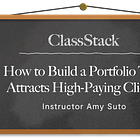✍️ How to Get Hired as a Freelance Book Editor
Get paid to read books and give notes.
Hey writers — just a quick heads up: our first ClassStack class is today at 3pm PT/6pm ET! I’m sharing how to build your writing and editing portfolio to land better clients.
If you’re a paid subscriber, you can access the RSVP here to get the Zoom link:
🎁 New Community Perk! I’ll be comping paid Substack subscriptions to writers who regularly share great freelance job leads in the Subscriber Chat. If you’ve come across a freelance or contract/part-time writing or editing job (no full-time roles, and remote writing or editing roles only), drop it in the chat! Each month I’ll be gifting comped month- or year-long subs to folks helping support the community.
🚨 Two book editing jobs close EOD today!
A freelance developmental editor is needed for a thriller novel (pay range: $2,500-$5,000)
A freelance line editor is needed for a romance memoir/novel based on a true story
Apply ASAP if you’re interested — both listings are on the writing job board.
In today’s newsletter, you’ll read about:
✨ How to break into freelance book editing and the difference between line editing and developmental editing
✍️ High-paying writing jobs you may have missed last week
📚 Writing wins from the community here at From the Desk!
✍️ Missed This Past Week’s Writing Jobs?
Did you miss it? Here are the writing jobs on this past week’s job board:
A top entertainment platform is seeking writers to cover all things Pokémon, from anime to upcoming game releases.
A global content agency is looking for a regulatory writer to handle scientific documents. $65–$73/hour for a long-term contract.
An influential tech publication is open to pitches on cutting-edge innovations and their real-world impact. $1–$2/word.
If you missed the last issue of my writing job board, check it out at the link below:
🙌 Writing Community Wins!
Here’s what some of your fellow writers in the community have been up to lately:
Lizabeth Yandel got her pitch accepted! Here’s what she shared: “I pitched to Business Insider from your job board post, and they picked it up, so I'm working on an article for them now. Thanks so much!” Congrats, Lizbeth!
Dragonfly de la Luz has had quite a few different wins lately! Here’s what they shared: “So many wins! Highlights include getting signed to edit two books of poetry for two different people, a memoir I ghostwrote becoming an Amazon bestseller, and finding the courage to post a true erotic piece in my new Substack, "Wander. Lust." Feeling giddy and giggly!🤭” Enjoy all of the good things coming your way!
Piper Schultz hit 10k words on a draft of a project that’s a rewrite. Keep up the great momentum, Piper!
Kevin Frasure published his short story collection on Amazon! Congrats, Kevin.
❓ Want to see your community wins featured in an upcoming newsletter? Every week in my subscriber chat I ask for what amazing feats you’ve achieved that week, and I pick a handful to highlight.
Access the subscriber chat below:
🫖 Sunday Tea: How to Get Hired as a Freelance Book Editor
If you’re looking for more consistent writing-adjacent income — book editing might be your next move.
But first: let’s define what book editing really means, because there are two very different types of editors in this world…
1. Developmental Editors: Book Architects
Developmental editors help authors rethink and restructure their books on a big-picture level. It’s not about grammar — it’s about storytelling.
As a developmental editor, your focus is on things like…
Narrative structure and pacing. Is the pacing varied and keep the reader glued to the page? Or does the structure need to be changed to fix a sagging act two?
Character development. Are the characters changing in a satisfying way? If a character doesn’t change, does that add to the meaning and messaging of the book? Is there a clear antagonist of some kind that challenges the main character?
Theme and what the book is “about.” Theme is like the icing on the cake. Without icing, the cake looks bland. But with the wrong icing — or too much! — the cake is overpowered. What is this book truly “about” and is the theme underscored by the character’s journey in a way that makes sense?
Tone. Does the story’s tone match the author’s intended vision? Does it come across well to readers, or does it clash with the plot or characters in a way that keeps the book from working?
Genre expectations. Does this romance actually have all the scenes required of the romance genre?
On the rare occasion I take on a developmental editing job, I’m asking: what’s the disconnect between the author’s vision and what’s landing on the page? Developmental editing is a creative puzzle — and when done well, it transforms a draft from confusing to compelling.
💡 A great workflow:
Step 1: Read and leave in-draft notes (on clarity, pacing, structure, etc. — this is not the time to spot typos as you’re assuming big changes are still yet to be made to the draft)
Step 2: Write an Editor’s Letter summarizing your biggest recommendations
Step 3: Deliver both so the author sees your high-level take and specific in-line feedback
This kind of editing is perfect for anyone who loves solving story problems and coaching writers toward stronger drafts.
2. Line Editors: The Sentence Sleuths
Line editing is all about fine-tuning the actual language on the page. You’re editing for clarity, consistency, and flow — not just fixing typos.
Line editors handle:
Repetitive word use
Awkward phrasing
Character continuity
Clunky transitions
Tone inconsistencies
Errors or mistakes in the story
This is the kind of editing most people think of when they hear “book editor.” But it’s not just about grammar and spelling errors — that’s proofreading. Line editing is about making the sentences work harder.
A line editor might flag things like…
“This character had blue eyes in Chapter 2 and green eyes in Chapter 6.”
“You’ve used the word ‘glimmering’ 11 times in 20 pages.”
“This internal monologue doesn’t match the tone of the earlier scene.”
Some line editors pair their services with proofreading and hit two birds with one stone in their pass. Every editor has a slightly different approach to what they offer.
So… how do you get hired?
To land either type of book editing job, you’ll need:
A strong portfolio of sample edits (we’ll cover this in my ClassStack class today!)
Clear rates and scopes of work
A defined process that you walk clients through
A sense of your editorial superpower (big-picture structure? voice and tone? making memoirs flow like fiction?)
Some editors start by offering sample edits. Others begin with just a discovery call and sharing their portfolio with a potential client. There’s no one path — but clarity and confidence always help.
And once you’ve got a few testimonials or repeat clients? Editing can become a fulfilling (and flexible) part of your writing career.
💫 Amy’s Favorites: Organic Cotton > Plastic Pants
I love Lululemon leggings as much as the next girl, but over the past few years I’ve been slowly making the switch to organic cotton activewear — both for my health and the planet’s.
Right now, my two favorite brands are:
Mate the Label – their cotton biker shorts are my go-to for hot summer days
Pact – great for basics that feel good on your skin
Organic gear means less exposure to plastics, forever chemicals, and synthetic junk — and it’s better for the environment, too.
You don’t have to throw out your current wardrobe all at once: instead, you can swap out pieces one-by-one.
Enjoyed today’s post? Please give it a “heart” ❤️ and share or restack it.
Sending creativity and good writing vibes your way,
-Amy











Mate the label fills my closet 😍 The coziest work from home and travel wear!